Circuit Breaker
A circuit breaker is an automatically-operated electrical switch designed to protect an electrical circuit from damage caused by overload or short circuit. Its basic function is to interrupt the current flow when a fault is detected.
The different types of circuit breakers that are supported in Power Operation are:
| Type | Description |
|---|---|
| ANSI | ANSI High Voltage Rackable Circuit Breaker with Control |
| ANSI High Voltage Rackable Circuit Breaker | |
| ANSI Low Voltage Nonrackable Breaker Horizontal | |
| ANSI Low Voltage Rackable Breaker Vertical | |
| ANSI Low Voltage Nonrackable Breaker Vertical | |
| ANSI Low Voltage Rackable Breaker Horizontal | |
| ANSI Medium Voltage Nonrackable Breaker Horizontal | |
| ANSI Medium Voltage Nonrackable Breaker Vertical | |
| ANSI Medium Voltage Rackable Breaker Horizontal | |
| ANSI Medium Voltage Rackable Breaker Vertical | |
| IEC | IEC High Voltage Feeder with Earth Hr |
| IEC High Voltage Feeder with Earth with Control | |
| IEC High Voltage Feeder with Earth | |
| IEC High Voltage Incomer with Earth | |
| IEC High Voltage Nonrackable | |
| IEC High Voltage Rackable |
Supported item names and tags by breaker component
| ItemName | Variable tag | Supported field values | Description |
|---|---|---|---|
| BkrPos
BkrPos_On BkrPos_Off |
\XCBR1\Pos
\XCBR1\Pos_On \XCBR1\Pos_Off |
0, 1, 2 & 3
0 & 1 0 & 1 |
Position of circuit breaker (Intermediate, Open, Closed, Error) |
| BkrRkdPos | \XCBR1\CBRkdPos | 0, 1 & 2 | Breaker Rack-in/Trunk status (Racked-In, Racked-Out, Test) |
| BkrESwPos | \XCBR1\ESwPos | 0 & 1 | Earth Switch Status (Open, Closed) |
| BkrTr | \PTRC1\Tr | 0 & 1 | Breaker Trip Status (Normal, Tripped) |
If Double Point Status (DPS) is read from the field device through * \XCBR1\Pos or *\XCBR1\Pos_On and \XCBR1\Pos_Off tags, then the following table accurately represents all four states:
| Breaker position | XCBR1/Pos | XCBR1/Pos_On | XCBR1/Pos_Off |
|---|---|---|---|
| Intermediate | 0 | 0 | 0 |
| Open | 1 | 0 | 1 |
| Closed | 2 | 1 | 0 |
| Indeterminate/Error | 3 | 1 | 1 |
The graphic representation of the states of breaker components, as seen in the WebHMI (with advanced one-line animation), is displayed in the following table:
| States of a breaker | Graphic |
|---|---|
| Intermediate |
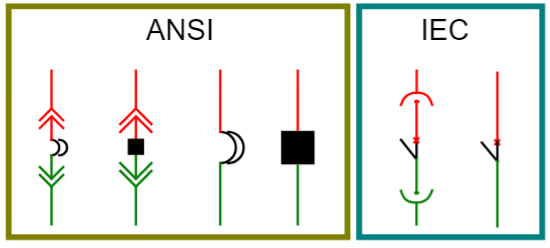
|
| Open |
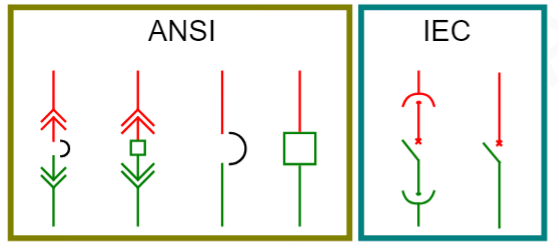
|
| Closed |
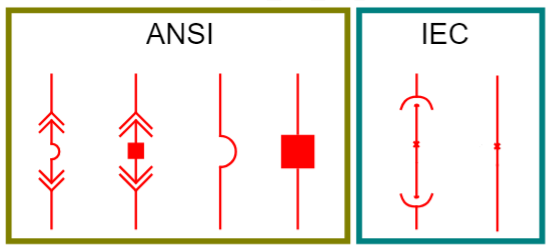
|
| Indeterminate/Error |
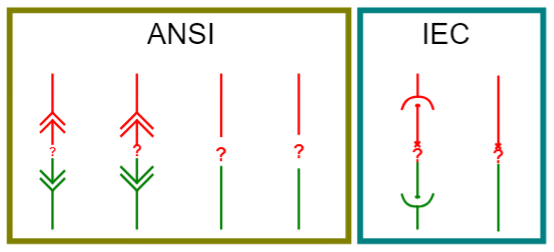
|
| Breaker in a tripped state |
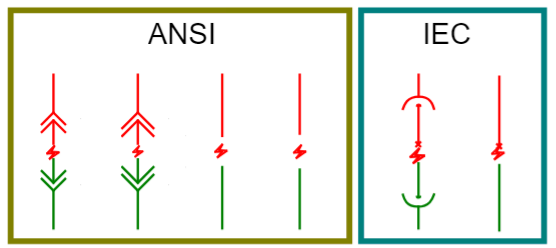
|
| Racked-in |
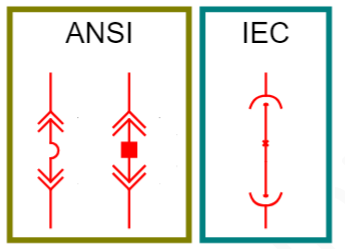
|
| Racked-out |
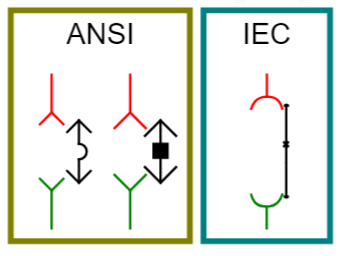
|
Breaker components with Standard and Custom item names in equipment
Standard items
To support the Advanced One-Line animations, there are four bindings for standard breaker components: 'IsActive', 'IsOpen', 'IsError', and 'IsInter'
The Connection Debugger creates the configuration file, OneLineConfiguration.json, and inserts the logic on the supported item name set for the equipment linked to the breaker component.
If the equipment contains a 'BkrPos' item (a variable tag), which provides the status of the breaker, then the following logic is generated:
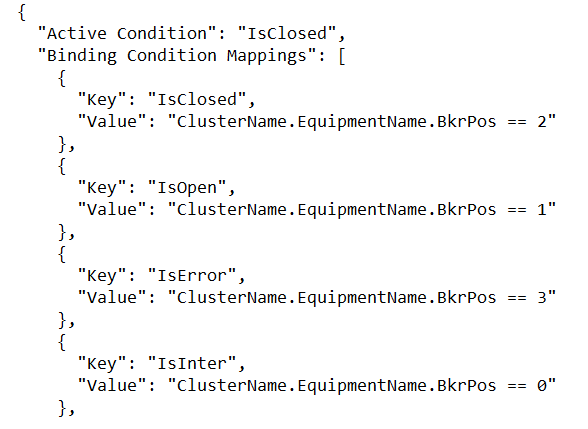
If the equipment contains 'BkrPos_On' and 'BkrPos_Off' items, which provide four states to support DPS, then the following logic is generated:
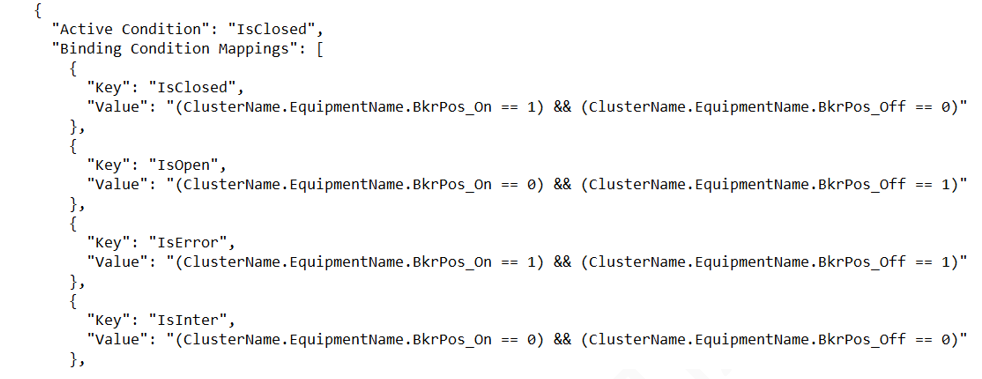
If the equipment contains only one digital 'XCBR1\Pos_On' or 'XCBR1\Pos_Off' item, then the following logic is generated:
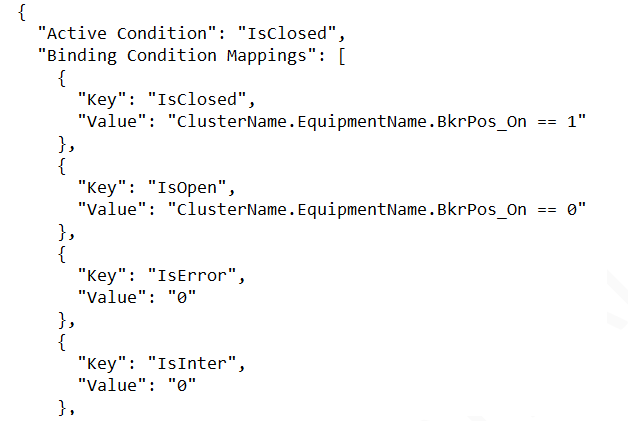
Or:
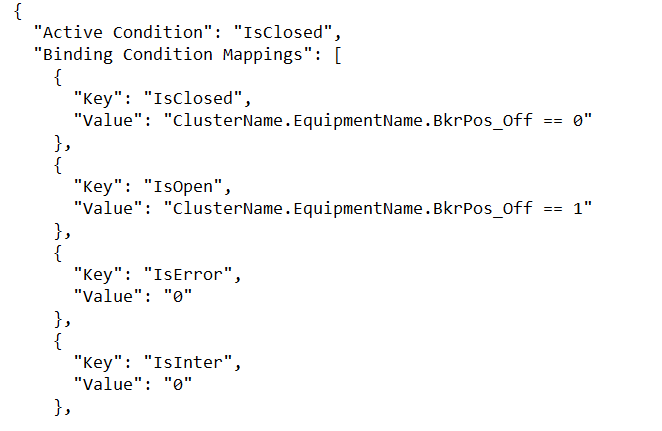
Custom items
To configure the custom item names (variable tags), you can add logic inside the exposed properties, such as 'BkrOpenCond', 'BkrErrCond', and 'BkrInterCond', along with the existing 'ActiveCondition' property, which determines the closed state of the breaker.
For example, if you are using the custom item 'MyBkrPos' for your equipment, "MyEquipmentName", then in order to read the breaker state (Open/Closed) from the field device, you may need to configure the exposed properties in the following way:
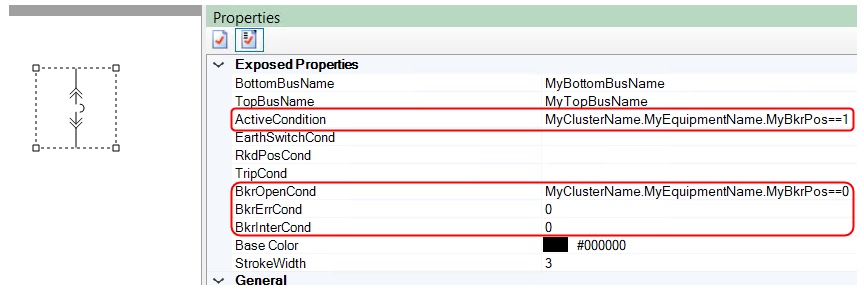
After the Connection Debugger reads the exposed properties, it generates the OneLineConfiguration.json file, as shown in the following:
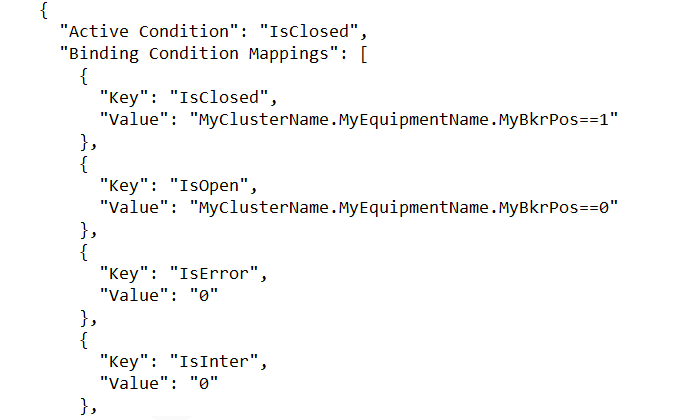
NOTE: If the field device does not have supported tags to retrieve the required status, Error and Intermediate in this example, then you must set the exposed properties to '0'.
NOTE: If you set values for the exposed properties of a component, then the Connection Debugger will use the values to generate the logic inside of the OneLineConfiguration.json file over the standard items. This will occur even if values are already set for the equipment linked to the component.
From Power Operation 2022 CU6 and above, Double Point Status (DPS) support has been added to standard breaker components. For information on upgrading TGML graphics to include the latest changes made to the graphics components from previous versions, see Upgrading Project TGML Graphics.